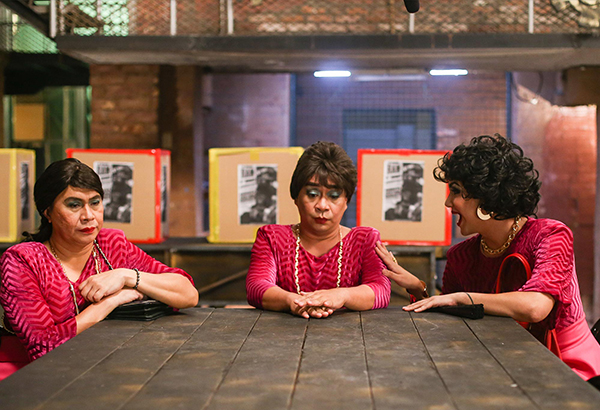REVIEW: A tale of two comedies

Enteng Kabisote 10 and the Abangers exemplified the extent of how the MMFF, when lazily run with a profit-oritented objective, results in films that are as seasonal and forgettable as the glittery balls that pepper our fake Christmas trees.
MANILA, Philippines - “It was the best of times, it was the worst of times, it was the age of wisdom, it was the age of foolishness.”
The great Charles Dickens opened A Tale of Two Cities with a sentence that expressed the duplicity of the times. This, however, isn’t about the beloved classic novel set in the cities of Paris and London at a time of inevitable change.
This is about two comedy movies of more modest ambitions, both eased out of the yearly Metro Manila Film Festival that they claimed as their home — except that the festival changed, preferring quality over profit. The two comedies, both of which are produced by studios of considerable clout within an industry that values seniority, quickly found play dates where their only competition was a foreign animated flick. It was close to the monopoly that they were used to, the monopoly that slowly but surely mutated the film festival from being the showcase of the best films Filipinos can craft into a carnival of shallow rides and gaudy spectacles. Despite having the next best thing to enjoying the perks of being part of the film festival, only one of the two movies did well.
For years, the film festival was left un-marshaled, with rules that were lax and procedures that were constantly bent. This allowed studios to mold their entries, which almost certain to be selected as part of the fest on the basis of star power and some semblance of a synopsis, to maximize profits by investing only in cheap slapstick and low-rent special effect and not in depth or actual flavor. The shrewd studios had a captive audience of Filipinos with an additional month’s worth of buying power. This wasn’t a time for gift-giving, of actually producing worthwhile entertainment that said something beyond a lousy and repetitive story and some token lesson; this was a time for commerce in its ugliest sense, for bad products being patronized because of a good-hearted protectionist policy that was abused to reward mediocrity. Tony Reyes and Marlon Rivera’s Enteng Kabisote 10 and the Abangers is probably the best evidence of how certain films owe their success to the film festival, as opposed to the very wrong notion of that film festival owing its existence to the films that do well commercially.

Enteng Kabisote was supposed to be invincible
Enteng Kabisote, however, is supposed to be invincible. After all, behind the character that had generations of Filipinos beholden to its incoherent myth of an ordinary family man battling fantastical forces is Vic Sotto, who, armed only with his timeless wit and a lucrative noontime show, survived decades in an entertainment business that is best described as mercurial when it comes to what is in and what is out. However, without the protective embrace of the Metro Manila Film Festival, it looked and felt like a mess. Its comedy is old and lazily conceived. It is essentially a patchwork of various antics delivered by almost everybody that Sotto’s noontime show recruits to entertain on a daily basis. It is just hard to remove the movie from its television sources, and if the audience had to choose whether to financially invest in something that feels like television or to simply enjoy watching TV for free, the latter would be the more logical choice. In other words, Enteng Kabisote 10 and the Abangers exemplified the extent of how the film festival, when lazily run with a profit-oriented objective, results in an abundance of films that are watchable only as part of the yuletide season — of films whose function is as seasonal and forgettable as the glittery Styrofoam balls that pepper our fake Christmas trees.
Joyce Bernal’s The Super Parental Guardians, the dropout that unsurprisingly found success outside the auspices of the film festival, exposes graver concerns. See, director Wenn Deramas has turned inanity into a lucrative business. Within his very prolific career of churning out hilarious and irreverent pics like Ang Tanging Ina (2003), Pasukob (2007) and Moron 5 and the Crying Lady (2012), he was able to do something enormous, which is to turn Vice Ganda into not just a bankable movie star but an unstoppable phenomenon. This is very important because Ganda’s ability to bring people into theaters is sort of symbolic of a general patronage of whatever she represents, whether it be gender equality, on a positive side, or insensitive comedy. Essentially, what I am trying to say here is that while pop culture is reliant on society to shape itself, pop culture, especially when very effective, shapes society. In that sense, films that endeavor to reach out to as many people as possible do not only have the responsibility to entertain, but also the obligation to shape society in a certain way that will not devolve it.

The Super Parental Guardians manages to normalise what should never be normal, turning death into a punchline.
A confused film
Unfortunately, The Super Parental Guardians is a confused film. It draws its plot and, sadly, some of its comedic ploy from current events. Clearly set during Duterte’s reign, the movie would have been bright and brave had it been clear that it was politically charged, that it was a satire that utilized whatever pull and goodwill Vice Ganda has to depict the absurd horrors and the horrific absurdities of the times. However, it is the commingling of Ganda’s comedy bar-style punchlines with the depiction of events that are too real that makes the film more than just a bit exploitative of the times. It would have been fine if exploitation were the only thing the film could be accused of; however, the film manages to normalize what should never be normal. It turns death into a punchline, and death under sinister motives into a pointless adventure that climaxes in a self-serving joke about the movie’s non-inclusion into the film festival’s Magic Eight.
In a world where mass entertainment is so powerful that it has not only produced senators but also the president of the most powerful country on the planet, those in the business of making entertainment should keep in mind that its stakeholders are not just shareholders but also the nation and the society that shapes its soul. If the entertainment that today’s society is imbibing consists of children laughing at the grave misfortunes of other people and giggling at the atrocities committed by the state, then it wouldn’t be too farfetched to believe that the future is a place where safety cannot be guaranteed. In fact, it is already happening, with nameless victims of murders being discovered with cardboard signs bearing carelessly crafted phrases that turn the entire atrocity into a joke.
“It was the epoch of belief, it was the epoch of incredulity, it was the season of Light, it was the season of Darkness.”
The last few phrases of Dickens feel more apt to the times. Cinema is, after all, the art of light, but a certain irresponsibility in harnessing its power can result in darkness.
* * *
Tweet the author @oggsmoggs.
















